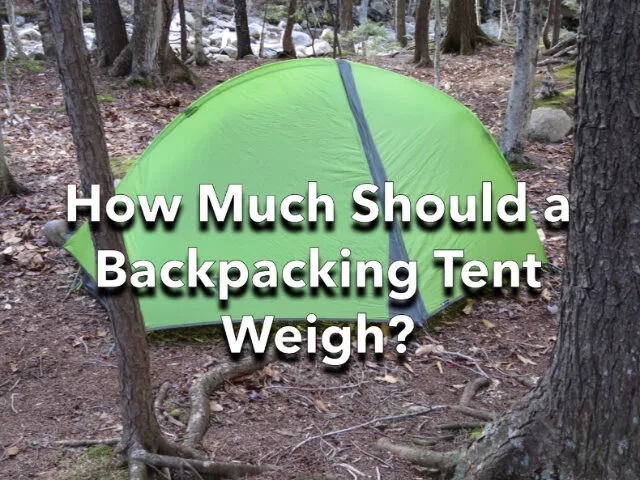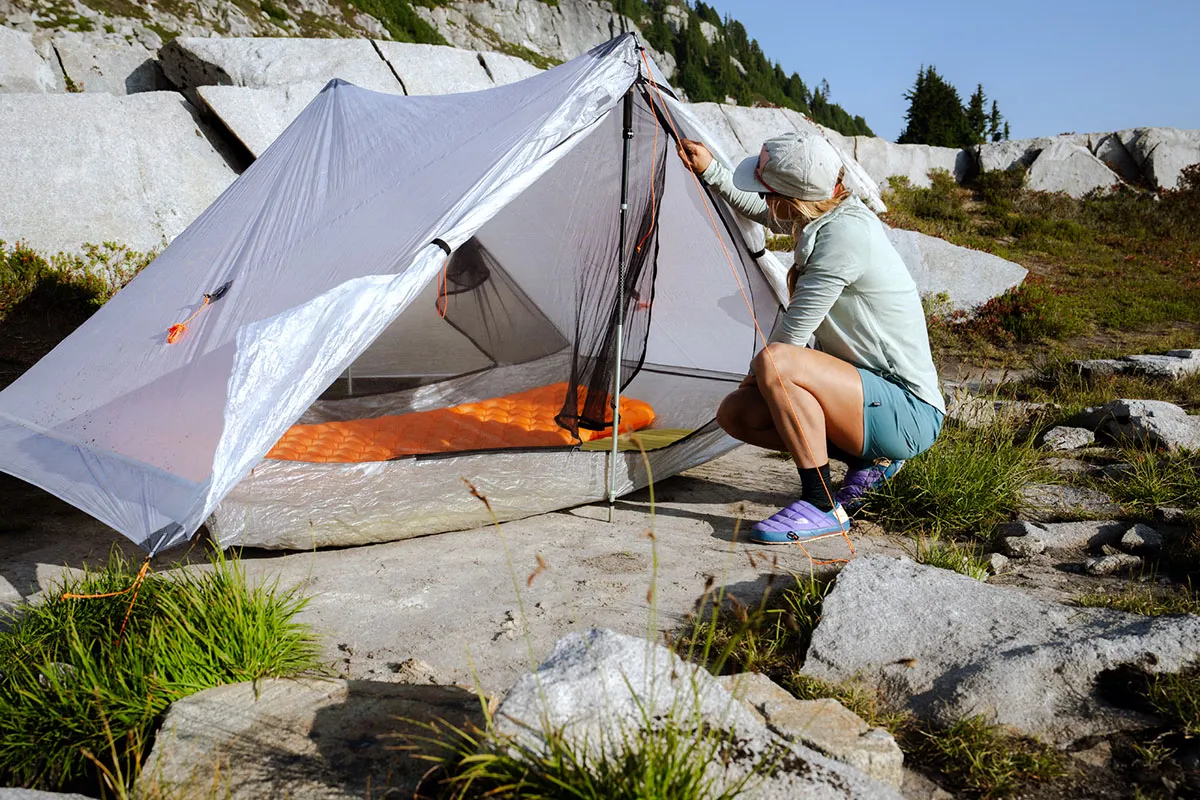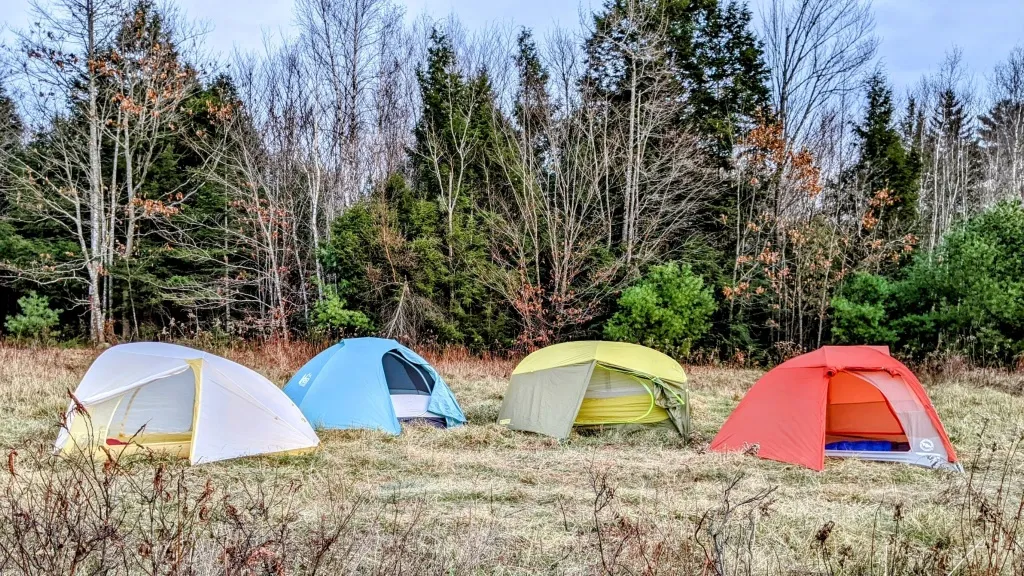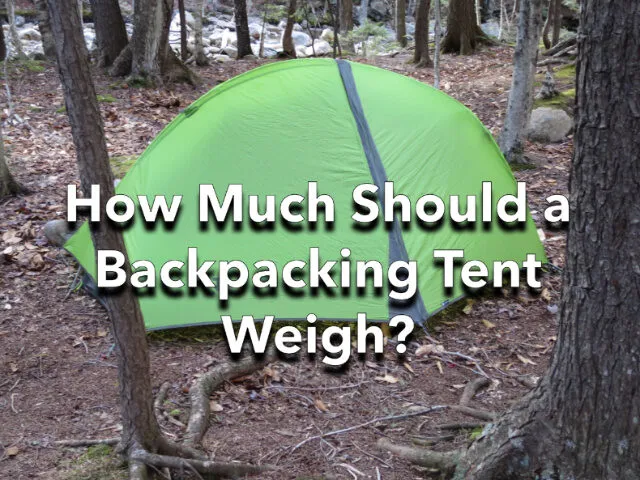After spending countless nights testing tents across various terrains, I can tell you that determining if 5lbs is too heavy for a backpacking tent depends on your specific needs and hiking style. This comprehensive guide examines the trade-offs between weight, durability, and comfort to help you make the perfect choice for your outdoor adventures. Visit Nature Guests for more expert outdoor gear advice.
Understanding Backpacking Tent Weight Categories

When I first started backpacking fifteen years ago, my tent weighed nearly 7 pounds, and I thought that was normal. After years of experience and testing dozens of tents across the Appalachian Trail and Rocky Mountains, I've learned that understanding tent weight categories is crucial for making informed decisions.
The backpacking community generally categorizes tents into four weight classes. Heavyweight tents (4.5+ pounds) offer maximum durability and weather protection but can significantly impact your pack weight over long distances. Midweight tents (3.25-4.5 pounds) provide a reasonable balance between comfort and weight, making them popular among weekend warriors.
Lightweight tents (2-3.25 pounds) represent the sweet spot for serious backpackers, offering substantial weight savings without major compromises. These tents often feature advanced materials and streamlined designs. For those wondering is 5lbs too heavy for a backpacking tent, the answer typically depends on your hiking style and priorities.
Ultralight tents (under 2 pounds) push the boundaries of weight reduction, often requiring trade-offs in durability, space, or weather protection. During my thru-hike of the Continental Divide Trail, I witnessed fellow hikers switching from 5-pound tents to ultralight options after experiencing the cumulative fatigue of carrying extra weight. Understanding these categories helps answer whether 5 pounds is excessive for your specific needs. For more insights on why ultralight tents are so expensive, consider the advanced materials and engineering required.
Is 5lbs Too Heavy for a Backpacking Tent? The Reality Check
Based on my extensive field testing and conversations with experienced backpackers, a 5-pound tent is generally considered heavy for serious backpacking, though not prohibitively so. The key question isn't simply is 5lbs too heavy for a backpacking tent, but rather whether the benefits justify the extra weight for your specific hiking style.
During my section hike of the Pacific Crest Trail, I carried a 4.8-pound tent for the first 200 miles before switching to a 2.3-pound ultralight model. The difference was immediately noticeable, especially during long ascents and when hiking 20+ mile days. However, the heavier tent provided superior weather protection during unexpected storms in the Sierra Nevada.
Expert Tip: For every pound of weight you carry, you'll transport it over 2,000+ miles on a thru-hike. That 5-pound tent becomes equivalent to carrying 5 tons over one mile!
The advantages of heavier tents include increased durability, better weather resistance, more interior space, and often lower cost. These factors make 5-pound tents appealing for car camping, occasional backpacking, or situations where maximum protection is prioritized over weight savings. Many beginners start with heavier tents and gradually upgrade as their experience and commitment to the sport grows.
However, the disadvantages become apparent on longer trips or challenging terrain. The extra 2-3 pounds compared to lightweight alternatives can contribute to fatigue, slower hiking speeds, and reduced enjoyment. During my traverse of the Wind River Range, group members with 5+ pound tents consistently lagged behind and expressed more fatigue by day's end. For those exploring ultralight backpacking tent 1 person options, the weight savings can be even more significant for solo adventurers.
Ultralight Alternatives: Going Below 3 Pounds

After questioning is 5lbs too heavy for a backpacking tent during my early backpacking years, I've become an advocate for ultralight alternatives. Modern tent technology has revolutionized weight reduction without completely sacrificing performance, though understanding the trade-offs remains crucial.
Single-wall tents represent one approach to weight reduction, combining the tent body and rainfly into one piece. During my use of a 1.8-pound single-wall tent in Olympic National Park, I experienced some condensation issues but appreciated the simplified setup and significant weight savings. Double-wall ultralight tents, typically weighing 2.5-3 pounds, offer better ventilation while still providing substantial weight reduction.
Trekking pole tents eliminate traditional poles by utilizing your hiking poles for support, often reducing weight by 8-12 ounces. I've used this style extensively in the White Mountains, finding the setup initially challenging but ultimately appreciating the versatility and weight savings. Semi-freestanding designs require minimal staking while maintaining structural integrity.
Material innovations like Dyneema Composite Fabric (DCF) and ultra-thin nylons enable dramatic weight reductions. However, these materials often come with increased costs and durability concerns. During my testing of various ultralight tents, I've found that careful handling and proper campsite selection become more critical with lighter materials. For couples considering shared shelter, ultralight backpacking tent 2 person options can distribute weight between partners while maintaining comfort.
Expert Analysis: Tent Weight vs Performance
Watch this detailed breakdown of how pack weight affects your backpacking experience
Key Factors When Choosing Tent Weight
Beyond simply asking is 5lbs too heavy for a backpacking tent, successful gear selection requires evaluating multiple factors that influence your hiking experience. During my years of guiding backpacking trips in various conditions, I've identified several critical considerations that often override pure weight concerns.
Trip Length & Distance
Longer trips amplify weight penalties. A 5-pound tent on a weekend trip differs drastically from a 3-week expedition.
Weather Conditions
Harsh weather may justify extra weight for improved protection and peace of mind.
Personal fitness and hiking experience significantly influence weight tolerance. During my early backpacking days, I struggled with a 40-pound pack, making every ounce crucial. Now, with improved fitness and technique, I can comfortably carry heavier loads when conditions warrant. However, this doesn't mean weight becomes irrelevant – it simply provides more flexibility in gear selection.
Group dynamics also affect tent weight decisions. Solo hikers bear the full weight penalty, while partners can share tent components. I've witnessed couples successfully use 4-5 pound tents by dividing poles, stakes, and tent body between packs. Budget constraints often drive gear choices, as ultralight options typically cost 2-3 times more than heavier alternatives.
Terrain difficulty amplifies weight impact. Technical scrambling, high-altitude hiking, and challenging weather make every pound more significant. During my climb of Mount Whitney via the mountaineers' route, carrying my 2.2-pound tent instead of a 5-pound option proved crucial for maintaining energy and safety margins. Those seeking more spacious options might explore ultralight tent 2 person models that maximize interior volume while minimizing weight.
Real-World Testing: My Experience with Different Tent Weights

My journey to answer is 5lbs too heavy for a backpacking tent involved extensive field testing across diverse conditions. Over the past decade, I've logged over 200 nights in tents ranging from 1.5 to 6 pounds, documenting performance differences in various scenarios.
During a challenging 12-day traverse of the John Muir Trail, I started with a 4.9-pound tent that provided excellent weather protection during early season storms. However, by day 6, the cumulative fatigue from extra weight became noticeable, especially during the ascent of Forester Pass. This experience reinforced that weight tolerance varies with trip duration and physical demands.
Field Test Results Summary:
- 5+ pound tents: Excellent durability, noticeable fatigue after day 3
- 3-4 pound tents: Good balance for most conditions
- 2-3 pound tents: Optimal for long-distance hiking
- Under 2 pounds: Requires careful handling, best for experienced users
Weather testing revealed interesting insights about the weight-protection relationship. During a particularly brutal storm in Glacier National Park, my 1.8-pound ultralight tent struggled with wind stability, while nearby campers with heavier tents weathered conditions more comfortably. This experience taught me that weight isn't everything – sometimes those extra pounds provide critical performance benefits.
Solo versus group dynamics also influenced my weight preferences. When hiking alone, every ounce mattered more, pushing me toward ultralight options. However, when guiding groups or hiking with partners, sharing tent weight made 4-5 pound options more practical. The social aspect of camping also affected tent choice, as larger, heavier tents provided better communal space during storms. Understanding these real-world trade-offs helps determine if 5 pounds is excessive for your specific situation. You can read more about this topic at our comprehensive tent weight guide.
Top Tent Recommendations by Weight Category
After extensive testing and research, I've identified standout tents across different weight categories. Rather than simply asking is 5lbs too heavy for a backpacking tent, focus on finding the optimal tent for your specific needs and budget.
Big Agnes Copper Spur HV UL2
Weight: 3 lbs 2 oz | Price: $530
Category: Lightweight Premium
My go-to tent for serious backpacking. Excellent balance of weight, space, and durability. Used it for 50+ nights without issues.
View on Amazon - $408.06MSR Hubba Hubba 2
Weight: 3 lbs 4 oz | Price: $550
Category: Lightweight Reliable
Industry standard for reliability. Slightly heavier but incredibly durable. Perfect for harsh conditions and beginners to ultralight camping.
View on Amazon - $384.97Nemo Dagger OSMO 2P
Weight: 4 lbs 2 oz | Price: $530
Category: Midweight Spacious
Exceptional interior space and comfort. Great for car camping and occasional backpacking where weight isn't the primary concern.
View on Amazon - $496.79Big Agnes Tiger Wall UL2
Weight: 2 lbs 8 oz | Price: $450
Category: Ultralight Semi-Freestanding
My top ultralight recommendation. Semi-freestanding design with excellent weather protection. Perfect for serious weight-conscious backpackers.
View on Amazon - $382.46REI Co-op Half Dome SL 2+
Weight: 4 lbs 11.5 oz | Price: $349
Category: Heavyweight Budget
Best value for beginners. Heavier but very reliable and spacious. Great for learning backpacking basics before upgrading to lighter options.
Similar Option - $139.95Each tent category serves specific needs and preferences. The question of whether 5 pounds is too heavy ultimately depends on your priorities, experience level, and hiking style. I recommend starting with a proven midweight option and upgrading to ultralight as your skills and commitment to backpacking develop.
Conclusion
After years of field testing and thousands of miles on trail, my answer to is 5lbs too heavy for a backpacking tent is nuanced. For serious long-distance hiking, especially solo adventures, 5 pounds is generally heavier than optimal. However, for weekend trips, beginner backpackers, or situations prioritizing maximum weather protection, a 5-pound tent can be perfectly reasonable.
The evolution of tent technology has made lightweight options more accessible and affordable than ever before. Modern 2-3 pound tents offer remarkable durability and weather protection, making them excellent choices for most backpackers. I've found that the sweet spot typically lies between 2.5-3.5 pounds for two-person tents, providing the optimal balance of weight, comfort, and reliability.
Consider your specific needs, experience level, and budget when making tent decisions. Start with proven designs from reputable manufacturers, and don't hesitate to upgrade as your skills and preferences evolve. Remember that the best tent is the one that matches your hiking style and provides confidence in various conditions.
Ultimately, successful backpacking depends on the entire gear system working together harmoniously. While tent weight is important, it's just one factor in creating enjoyable outdoor experiences. Focus on gradual improvements to your entire kit rather than obsessing over single items. The weight savings from upgrading multiple pieces of gear often proves more impactful than dramatically lightening just your tent.
Ready to find your perfect tent weight? Explore more expert gear guides and outdoor tips at Nature Guests for informed decisions on all your backpacking equipment needs.


